College Info
Japan Women's College of Physical Education
- Overview of our College
- Program Organization Chart
- Undergraduate Programs
- Graduate Programs
- Academic Calendar
- Clubs
- Campus Facilities
- Access to JWCPE
- For Inquiries
Overview of our College
History of Japan Women's College of Physical Education
"Women's sports should be elegant and feminine, producing healthy mothers," said Tokuyo Nikaido, the founder of the Nikaido Taisojuku (Nikaido Gymnastic Private School), which was the forerunner of the Japan Women's College of Physical Education. In 1913, Nikaido went to the UK, a country of advanced sports at that time, and studied for 2 years at King's Field College. During her stay in the UK, she found her mission in life to be a sports educator. After returning to Japan, Nikaido founded Nikaido Taisojuku believing in, "Women's sports by women". Adopting the philosophies of the schools at which she had studied in the UK, she formed her own educational philosophy: "To achieve the ideal of women's sports which combine both strength and elegance, the school needs to take an holistic approach to education and a broad perspective of people's lives, including food, clothing and shelter, to raise an elite". Nikaido's philosophy was for producing outstanding teachers of physical education, and the philosophy has been passed on to today's students. Nikaido Taisojuku produced 500 up-and-coming teachers of physical education within 4 years of its foundation, and the superb sprinter Kinue Hitomi, Japan's first female Olympic medalist in the Taisho Era, was one of the graduates. Japan Women's College of Physical Education has been nurtured by these proud traditions.
Chronology
| 1922 | Nikaido Taisojuku (Nikaido Gymnastic Private School) is founded. |
|---|---|
| 1926 | Nikaido Taisojuku is approved by the Ministry of Education as the first women's college of physical education in Japan. |
| 1950 | The Educational Foundation Nikaido Gakuen is established. The Japan Women's Junior College of Physical Education is opened with two courses: Physical Education, and Kindergarten, Day Nursery-Care and Education. |
| 1965 | The Japan Women's College of Physical Education establishes the Faculty of Sports and Health Sciences. |
| 1967 | Physical Education Major and Dance Major are established at the Physical Education Course of Japan Women's Junior College of Physical Education. |
| 1992 | The 70th anniversary |
| 1993 | The Graduate School is opened. |
| 1999 | Two departments, Movement Sciences and Sports Wellness Sciences are established as a result of the reorganization of the college. |
| 2003 | The 80th anniversary |
Program Organization Chart
The program of Japan Women's College of Physical Education consists of 1 faculty, 4 departments, and a graduate school.
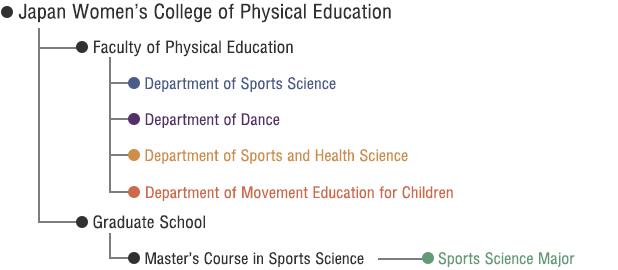
Undergraduate Programs
- *The classroom medium of instruction is Japanese.
Department of Sports Science
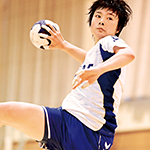
The Department of Sports Science focuses on sport methods, sport coaching, and sport conditioning. Students learn both theory and practice in teaching sports, physical training, sports technique, and sports tactics. The department provides courses designed to improve students' sporting skills in the field of competitive sports.
Department of Dance
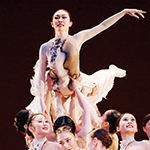
The Department of Dance centers on dance art and dance teaching methods. Students learn various dances including Classical Ballet, Modern Dance, Contemporary Dance, Jazz Dance, Tap Dance, Spanish Dance, Japanese Classical Dance, and others. The department also provides students with experience of creation, directing, stage performance, producing, and management of dance, in addition to acquiring substantial theories for dance teaching methods, dance aesthetics, history of dance, dance kinetics, and others.
Department of Sports and Health Science
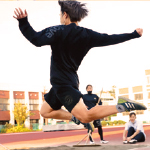
The Department of Sports and Health Science focuses on sports education, the coaching of health exercises, and sports management. The department nurtures human resources to contribute to modern society, which is aging rapidly and which has increasing leisure time. The department offers many courses linked to the relationship between sports and health, and lifelong sports.
Department of Movement Education for Children
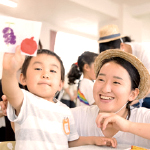
The Department of Movement Education for Children centers on the health and development of children, and their mental health care. The department features a wide range of curriculum subjects on play and games, songs, playing piano, and teaching practice. Students can gain hands-on experience by teaching at the college-affiliated kindergarten.
Certificates Attainable
Sports Sciences, Dance Studies, Sports Health Studies
- First-class teaching certificate for health and physical education at middle school
- First-class teaching certificate for health and physical education at high school
Child Development Studies
- First-class teaching certificate for kindergarten
- Nursery teacher certificate
- *The above-mentioned certificates are valid only in Japan.
Available Scholarships and Financial Aid
- Nikaido Gakuen Scholarship Foundation (Stipend)
- Shotokukai Scholarship (Stipend)
- Overseas Student Scholarship (Tuition reduction for privately financed students)
Job Placement
The Career Center of the college provides unique, effective career and job support
programs.
The graduates are active in a wide range of industries. Around half of them find positions in
the private sector, many take up professions, becoming teachers or instructors of lifelong
sports, while others pursue careers in various fields, such as public services, medical
services, welfare services, and show business.
Graduate Programs
- *The classroom medium of instruction is Japanese.
Master's Course in Sports Science (2-years course)
Sports Science Major
Objectives of the Graduate School
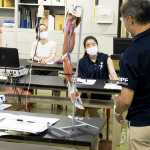
The objectives of the Graduate School are to research and teach scientific theories and their applications to sports and sports-related fields, develop leaders and researchers with a high degree of professionalism, and contribute to the improvement and advancement in sports science.
Students at the graduate school acquire advanced expertise as follows:
- 1.Sports and dance teaching expertise for school education from kindergarten to high school.
- 2.Lifelong sports teaching expertise.
- 3.Management expertise in the sports industry.
- 4.Expertise in teaching and assisting the sports elite.
- 5.Professional skills for dancers
- 6.Research and assistance expertise in the sports science field.
Certificates Attainable
- Specialized teaching certificate for health and physical education at middle school.
- Specialized teaching certificate for health and physical education at high school
- *The above-mentioned certificates are valid only in Japan.
Available Scholarships and Financial Aid
- Nikaido Gakuen Scholarship Foundation (Stipend).
- Overseas Student Scholarship (Tuition reduction for privately financed students).
Entrance Examination Schedule
- September: Graduate School Entrance Examination (Recommended application/ First Entrance Examination)
- February: Graduate School Entrance Examination (Second Entrance Examination)
Academic Calendar
| April | Enrollment Ceremony Orientation Foundation Day (April 15th) |
|---|---|
| July | First Semester Examination Period |
| August | Summer Vacation Dance Work Seminar Admissions Office Examination (First screening) |
| September | Beginning of the Second Term Admissions Office Examination (Second screening) |
| October | College Festival "Kembisai" |
| November | Entrance Examination for Recommended Applicants |
| December | Winter Vacation |
| January | Second Semester Examination Period Graduation Performance of Dance Studies |
| February | Entrance Examination |
| March | Graduation Ceremony/Completion Ceremony Spring Vacation |
Clubs
Sports Clubs
Track and Field, Swimming, Basketball, Handball, Volleyball, Tennis, Soft Tennis, Badminton, Softball, Football, Lacrosse, Table Tennis, Artistic Gymnastics, Rhythmic Gymnastics, Modern Dance, Competitive Dance, Dance, Fencing, Japanese Art of Archery, Naginata, Kendo, Shorinjikempo, Ski, Cheerleading, Lifesaving, Rubber Baseball, Song Leading, Golf Circle, Rowing Circle
Culture Clubs
Flower Arrangement, Chorus, Sign Language, Child Culture, Dance-Producing Society, Karadatukuri Society
Campus Facilities
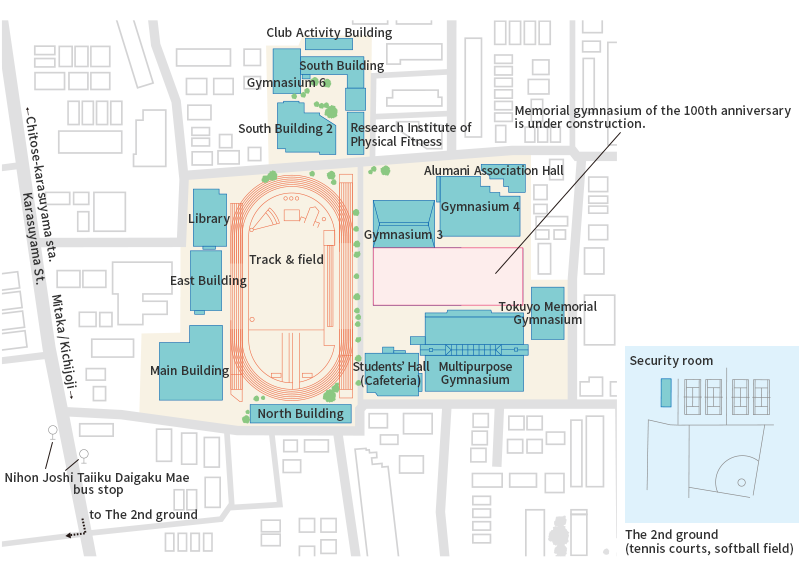
Access to JWCPE
Route Map
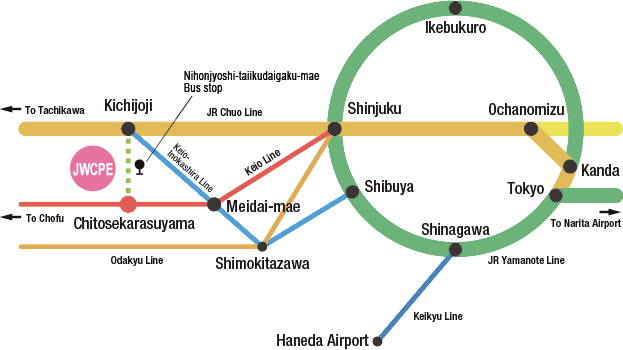
Time
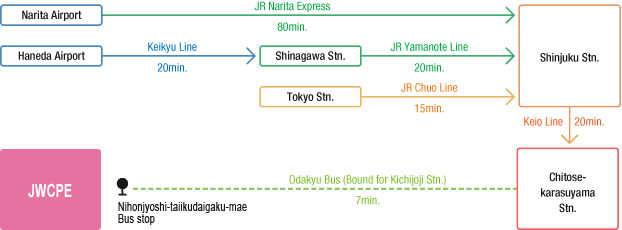
Access to the Campus from the nearest stations
- Keio Line--15 minutes from Chitose-Karasuyama Station
- JR Chuo Line--20 minutes (by bus) from Kichijoji Station


